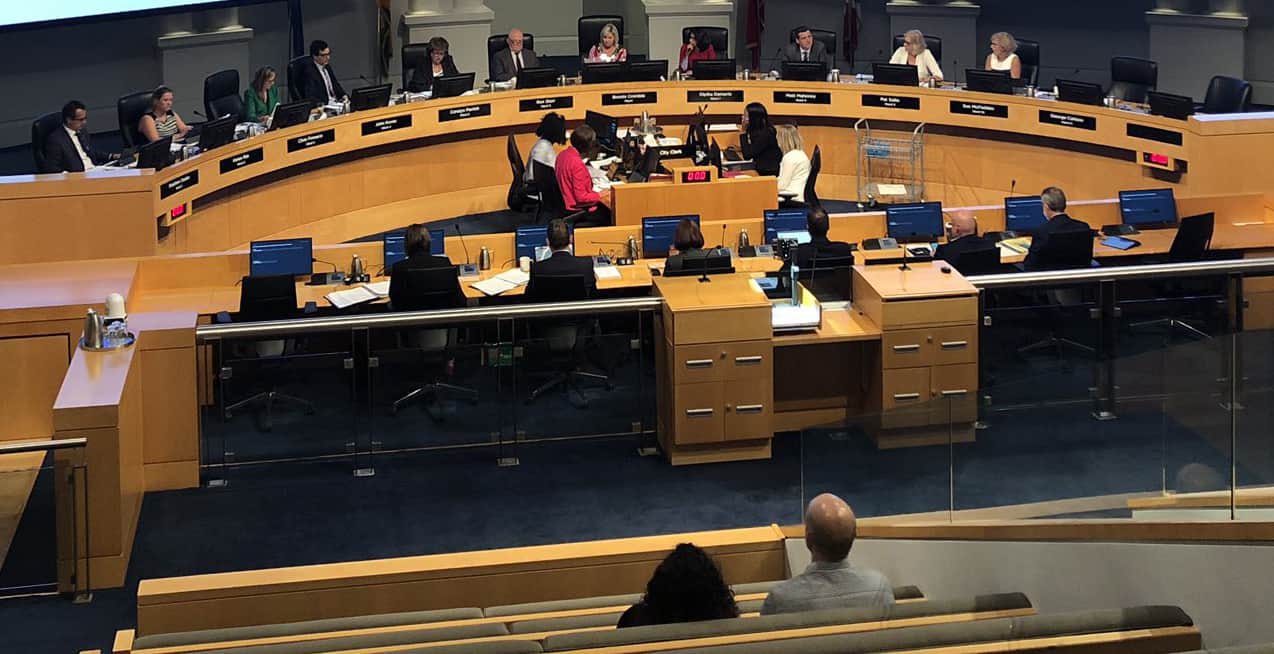Once vigorously opposed to strong mayor powers, Mississauga now more accepting
Published June 16, 2023 at 1:47 pm

Mississauga had been on record since last year with its vigorous opposition to the Ontario government’s plan to extend strong mayor powers beyond Toronto and Ottawa.
However, in the wake of Municipal Affairs and Housing Minister Steve Clark’s announcement today (June 16) that the province is now spreading those powers to 26 more municipalities, including Canada’s seventh-largest city, Mississauga’s response is somewhat more muted.
With Canada’s largest city and the nation’s capital both granted strong mayor powers last fall, Mississauga, Brampton, Hamilton and Oakville were among the more than two dozen cities and towns officially added to the list unveiled Friday morning by Clark.
Speaking at the Ontario Big City Mayors meeting, the minister said the additional municipalities will have strong mayor powers in place as of July 1.
Mississauga Mayor Bonnie Crombie and City council made clear their strong opposition, at the time, to Premier Doug Ford’s plan to grant greater powers to mayors when they adopted a resolution last August stating their case against the controversial move.
The strongly worded resolution was sent to the Province, MPPs and municipal associations to which Mississauga belongs.
Essentially, the City of Mississauga’s argument was that the municipality, and not specifically the mayor, should be given a larger role in key issues.
Other municipalities have also stated their opposition to strong mayor powers.
In an email statement from Crombie early Friday afternoon, the Mississauga mayor, who announced this week she’ll seek the Ontario Liberal Party leadership in the fall, was more accepting of the strong mayor powers.
“I welcome today’s strong mayors powers and see them being used in Mississauga sparingly and with a degree of caution,” Crombie said in the statement. “I agree it’s important we have the tools needed to get housing built, but to me a strong mayor is one that can build consensus with fellow members of council. I’m proud of our council’s track record in building consensus on a number of issues, including our recently released housing plan. That being said, there could be occasions where these powers would prove helpful, such as cutting red tape and advancing priorities that are shared by both the province and our city. Now that these powers are official, I plan to have a conversation with council about a framework for when and how they should be used.”

Mayor Bonnie Crombie says strong mayor powers could be helpful in certain cases.
In short, strong mayor powers provide expanded authority over municipal budgets and the hiring and firing of senior staff. Only a two-thirds vote of city/town council can overrule mayors on decisions regarding affordable housing projects, public transit, highways and other infrastructure projects.
The new powers are aimed at getting more homes built, according to the provincial government.
“By adopting ambitious and absolutely necessary housing pledges, these 26 municipalities have demonstrated they understand the importance of that target, and we are ensuring they have the tools they need to succeed,” said Clark.
Strong mayor powers/duties include:
- choosing to appoint the municipality’s chief administrative officer
- hiring certain municipal department heads, and establishing and re-organizing departments
- creating committees of council, assigning their functions and appointing the chairs and vice-chairs of committees of council
- proposing the municipal budget, which would be subject to council amendments and a separate head of council veto and council override process
- vetoing certain bylaws if the head of council is of the opinion that all or part of the bylaw could potentially interfere with a provincial priority
- bringing forward matters for council consideration if the head of council is of the opinion that considering the matter could potentially advance a provincial priority
In supporting the Mississauga resolution, which was introduced last August by Ward 5 Councillor Carolyn Parrish, Crombie noted at the time she’s always “been a proponent of broad municipal reform, but not of this nature.
“I wanted recognition of the growing role that cities are playing, especially with respect to revenue tools, or making two-tier cities like Mississauga a standalone city. That’s the kind of reform I’m looking for,” Crombie said.
The mayor added at the time that the City faces a growing list of responsibilities from addressing housing affordability to tackling climate change, building transit, attracting new investment and dealing with mental health, and “I think it’s time the Province takes a look at how cities can be better supported in the 21st century.”
Crombie concluded her remarks last August by stating that the City is structured effectively as it stands.
“I think we operate here on consensus. I think 90 to 95 per cent of our votes are unanimous,” she said. “My desire has always been to be that consensus builder. And we have a long history of dealing with a variety of issues without special powers (for the mayor) being needed or reserved in cases where action is needed.”
INsauga's Editorial Standards and Policies